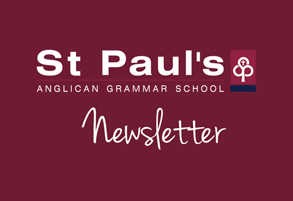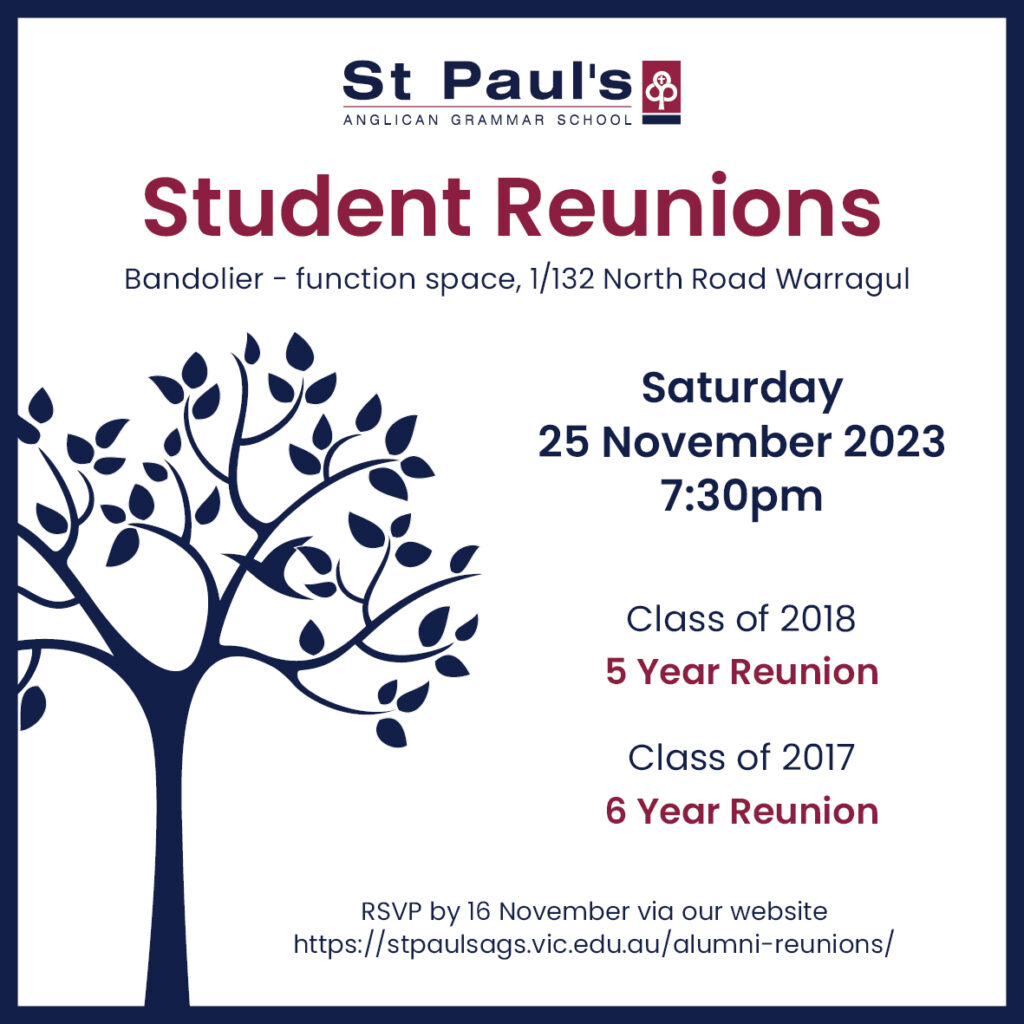In this issue
Careers News
What’s On:
• Warragul Secondary School
• Warragul Junior School
• Traralgon Secondary School
• Traralgon Junior School
CAREERS NEWS
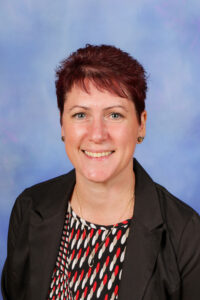
Year 12 students have now finished exams and the end of the school year is fast approaching for the rest of the year levels. It is time to take control of your future, have fun and plan what you would like to do next. For our Year 12 students, this is an exciting time of life, but it is also understandable if there are a few things that are confusing and give you cause to worry. Here are a few tips to remember:
- You are more than your results
- It is okay if you are unsure about the next step
- It is okay to change your mind, and finally
- You are not alone
Life does not always go to plan, which can be frustrating. You can make sure that you are prepared to deal with some of the “what ifs” by having a backup plan and options as detailed below:
If your ATAR is too low, you could:
- Speak to the university you want to study at and ask for advice about your options.
- Enrol in another course with a lower Selection Rank requirement, then apply to transfer into the course of your dreams during or after your first year.
- Do bridging courses and tertiary preparation courses to make you eligible for course entry.
- Finish a similar course with a lower Selection Rank requirement, then apply for a postgraduate course in the field you were aiming for.
If there are no apprenticeships or traineeships suitable, you could:
- Apply for other jobs and begin a VET qualification with a Registered Trading Organisation (RTO) of your choice while you wait for something to come up.
- Apply for entry-level jobs in your chosen industry, work hard, network and keep asking to be considered for opportunities for training or apprenticeships as they come up.
If you are struggling to find work, you could:
- Apply for entry-level jobs and start gaining hands-on work experience. Complete relevant short courses, micro-credentials and workshops and keep your resume updated.
- Create a professional social media profile, connect with industry professionals and make meaningful contributions to conversations.
- Pay for professional help to create an outstanding resume.
- Attend networking events or speak to friends, family and community influencers and let them know what you are looking for. They might not be able to offer you a job, but they could point you in the right direction, provide mentoring, or keep you in mind for future opportunities
As always, the Careers office is available so if you are unsure about your next step, get in contact with me to make an appointment.
“It’s not that I’m so smart, it’s that I stay with problems longer.” – Albert Einstein
Sarah Luck
Head of Careers
sluck@stpaulsags.vic.edu.au
Accessing VCE Results 2023
VCE study scores, ATAR and VTAC Scaled Study Scores will be available to students via the Results and ATAR website and the Results and ATAR app on Monday 11 December at 7:00 am. Students will receive a statement of VCE study scores from the VCAA, and those who applied for courses through VTAC this year and have paid their VTAC processing fees, will be sent an ATAR statement in the mail.
Students who wish to receive their results online will need to register at Results and ATAR before results are released.
Registrations are already open, and students are encouraged to register soon.
Note: To register, students need their VCAA student number and will be requested to choose a secure password upon registering.
Important Dates

| VTAC Personal Statement | Friday 1 December |
| ATARs Released | Monday 11 December |
| Change of Preference (CoP) closes | Wednesday 13 December |
| December Round Offers | Thursday 21 December |
| January Round International Offers | Friday 5 January |
| January Round Domestic Offers | Friday 12 January |
| February Round Offers | Tuesday 6 February onwards |
For a full list of cancelled, amended and new courses, visit VTAC Course Updates
University News
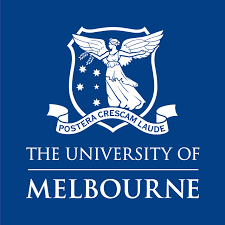
New Narrm Scholarship Program
The University of Melbourne has just launched its new expanded scholarship and enrichment program, available to Indigenous Australian students and to students enrolling through Access Melbourne, our Special Entry Access Scheme (SEAS).
In 2024, the university will be welcoming its inaugural cohort of Narrm Scholars, who will benefit from a $6,500 living allowance and tailored enrichment program designed to build their sense of belonging and connection with others in their wider cohort for the duration of their studies. Narrm Scholarships will be awarded to all students in eligible guaranteed cohorts, while in 2024 they will be offering approximately 200 additional Narrm Scholarships across other Access Melbourne categories.
Find out more: Narrm Scholarship
Studying Biomedicine or Science
Where can a Bachelor of Biomedicine Take You? Biomedicine is an excellent foundation course for students keen to become experts in various fields of biomedicine. The Bachelor of Biomedicine prepares students for a range of health-related postgraduate programs, specialised graduate research and a career contributing to the advancement of human health. Students often use Biomedicine as an undergraduate qualification into graduate study leading to professional careers in medicine, research, health sciences and even engineering.
For more information, including YouTube clips, and links to graduate pathways browse UniMelb: Where can a Bachelor of Biomedicine Take Me?
Where can a Bachelor of Science Take You? A Bachelor of Science is the first step towards a dream career in science, engineering, health, or technology. Once a student has completed their Bachelor of Science degree, they can go on to gain employment or begin a graduate degree and work towards a professional qualification. A Bachelor of Science degree can take a student in the direction they are passionate about, from food science to psychology.
For answers to Frequently Asked Questions, browse Science Undergraduate Studies
For other information, including further study into graduate degrees, students are encouraged to browse Where can a Bachelor of Science Take Me?
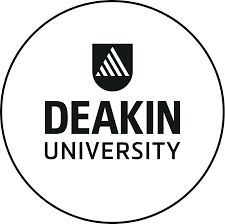
Deakin College Pathways to Deakin University
With a uniquely nurturing student experience, Deakin College is your simplest path to Deakin University.
Located across three Deakin University campuses – Melbourne Burwood, Geelong Waurn Ponds and Geelong Waterfront, Deakin College offers a range of one-year diplomas that articulate to second year bachelor studies at Deakin University. The diploma programs are equivalent to first year university. Each diploma consists of eight academic units, which students must complete and pass to receive the diploma.
Deakin College offers ten diplomas, and they all offer entry into a range of bachelor degrees.
Students who do not attain the ATAR they require for a bachelor degree at Deakin University might like to browse the Deakin College website to find out more about the options offered as a pathway to Deakin University.
Programs
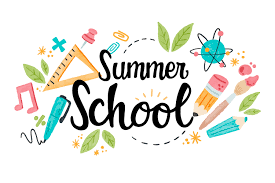 The School For Excellence Summer School
The School For Excellence Summer School
Offering face-to-face, in-person head start lectures at The University of Melbourne (Parkville)Work through a trial SAC assessment and maximise your subject ranks!
- Discover how to make your SACs stand out and earn the highest possible marks!
- Cover course materials ahead of school in a time-efficient and relatively painless way!
- Boost confidence and reduce stress levels & study loads in Term 1.
10–23 January 2024
Visit TSFX Summer School to find out more about the 2024 program or to enrol.
Access Education 2024 VCE SUMMER SCHOOL
One thing the Year 12 students of 2023 have learned is the importance of being prepared. You only have one chance to achieve your very best with the VCE. Access Education has prepared a multi–product bundle to complement its 2024 Summer School Webinar Program.
Get ahead of the pack and get prepared:
22–25 January 2024
What will you access? Extensive, live, interactive and online two-hour VCE preparation lectures.
You will also receive:
- Subject specific study notes
- Up to one hour of additional video content to view in your own time.
- Tips to better understand what the expectations are for VCE
- Techniques to reduce your stress levels
- A greater level of confidence
Visit VCE and HSC Exam Revision Lectures at Access Education to find out more or to download a brochure for the 2024 program.
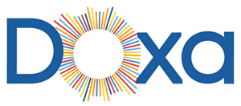
Doxa Cadetship
The DOXA Cadetship program supports talented young people facing challenging life circumstances to complete university and gain the skills needed for an employable future. The Cadetship program is open to Year 12 students transitioning to university and is a three to five-year program, dependent on the length of the degree and the sponsorship model.
The Cadetship program is open to young people facing challenging life circumstances who have finished high school and are about to go to university. This may include, but is not restricted to:
- Experiencing financial hardship,
- Having an Aboriginal and/or Torres Strait Islander heritage,
- Coming from a newly arrived migrant or refugee background,
- Having faced stressful life events,
- Coming from a rural or remote area, and
- Being the first in their family to have the opportunity to study at university and pursue a professional career.
The cadetship programme provides young people with:
- Practical and personal support during their university course,
- The opportunity to connect with peers and industry professionals through work placement and social events, and
- Personal development and training opportunities to enhance their employability.
For more information, download the Brochure, or visit Cadetship – Doxa Youth Foundation
Snapshot of Whitehouse Institute of Design in 2023
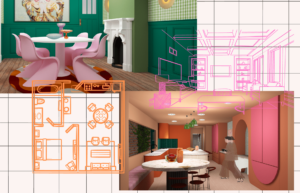
- Originally named the Whitehouse School, the institute was opened in 1988 in Sydney with the first accredited course being taught in 1992.
- Today Whitehouse is home to a creative community with diverse interests, talents and backgrounds at both the Sydney and Melbourne campuses.
- Whitehouse Institute of Design offers specialist higher education degrees and vocational education and training certificate courses.
- The Bachelor of Design is delivered over six trimesters so students complete their degree in two years. Students undertake five subjects per trimester with subjects divided into three specialisations of design focus:
- There are two vocational courses on offer for secondary school students through VETDSS: Certificate III in Design Fundamentals and Certificate IV in Design and both provide a direct entry to the Bachelor Design should students wish to further upskill.
- When browsing the Whitehouse Difference, students will note that the institute has strong industry connections both nationally and internationally.
- Students are encouraged to travel internationally and accept global exchange programs in Japan, London and Paris, with some of the best international design schools, visit: partnerships
- Awards and Scholarships are available to prospective and current students.
- Students choosing to move interstate can seek assistance from Whitehouse who can help advise students where and how to look for their living accommodation and home before their studies commence.
- The Whitehouse Institute is a private college, but students can access FEE-HELP which is a government loan scheme that helps eligible Australian fee-paying students (full-time or part-time) pay their tuition fees.
University Terms
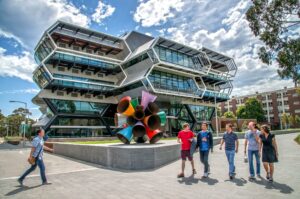 When students are looking into university study, they often come across words or terms they are unfamiliar with. Below are a few of the more commonly used terms to help students understand what is being talked about:
When students are looking into university study, they often come across words or terms they are unfamiliar with. Below are a few of the more commonly used terms to help students understand what is being talked about:
Associated Degree – an associate degree is generally a two-year qualification that is made up of two-thirds of a bachelor’s degree and may be offered by both TAFEs and universities. Students often use this as a stepping stone to the full Bachelor Degree.
Assumed knowledge – refers to subjects the university recommends or prefers a student to have studied at school before starting the course.
ATAR – Australian Tertiary Admissions Rank – the figure used by UAC and VTAC to calculate the entrance ranking for a university course.
Bachelor’s degree – the award/qualification a student gains when they have completed studies in an undergraduate course, which takes between three to four years of full-time study. This is the traditional starting point of a university qualification.
Bridging Course – an introductory course to help students achieve the preferred entry level to a degree, for example, a bridging maths course for students who do not have the preferred maths but need it to access a course.
Census Date – the last day a student can withdraw from their university course and not owe fees.
Commonwealth Supported Place (CSP) – a student’s enrolment in a university degree for which the Commonwealth government contributes towards the cost of that student’s education.
Credit – if a student has previously studied – perhaps at TAFE – and has Recognised Prior Learning (RPL), the student may be able to receive credit for a subject or subjects in their course. Also often referred to as Advanced Standing.
Double degree – a student can choose to complete a double degree – this integrates studies in two degrees resulting in an award of two degrees, usually after a minimum of four years of study. Often also referred to as Combined Degrees.
Defer – a student may choose to delay starting their course. Deferring an offer of a place might mean delaying for six or twelve months or up to two years. Deferment ensures the student is guaranteed their place in their selected course.
Elective – a subject that is not core to the degree and is often from another faculty, for example, a commerce student might choose psychology (from the Arts Faculty) as an elective.
Faculty – a department within a university devoted to a particular area of study, such as the Faculty of Arts or Faculty of Science
FEE-HELP – a loan scheme for domestic students used to pay all or part of an eligible student’s tuition fees for university courses but cannot be used for additional study costs such as accommodation or textbooks. A 20 per cent loan fee applies.
HECS-HELP – a loan scheme that assists domestic students with a CSP place to pay their contribution. Students may choose to pay their fees upfront or choose to defer payment via the HECS-HELP loan scheme.
Honours – many Bachelor degrees offer a fourth year – called an Honours year. The Honours year allows students to further focus on a particular area of interest. The Honours year can either be integrated into a four-year bachelor’s degree or be offered as a separate year after completion of a three-year bachelor’s degree.
Lecture – a period of teaching given by a lecturer to a large group of students in a lecture theatre; can often be as many as 300 students in a lecture.
Major study – an area within a course that allows in-depth study in a particular field. More than one major may be allowed in some courses.
Minor study – a grouping of subjects allowing a broader understanding of a few subjects, with less emphasis on in-depth study.
Prerequisite – a set of conditions – usually the completion of a subject – that must be met before enrolment in a subject or course is allowed.
SA-HELP – SA‑HELP is a loan scheme that assists eligible students to pay for all or part of their student services and amenities fees.
Transcript – this is the university academic record each student receives, like a school report.
Tutorial – a period of teaching given to a small group of students – involving discussion and participation.
Undergraduate – a student studying at university for a first-level degree, such as a bachelor’s degree.
VET Student Loans – a loan scheme for domestic students used to pay all or part of an eligible student’s tuition fees for TAFE courses but cannot be used for additional study costs such as accommodation or textbooks. A 20 per cent loan fee may apply.
Workplace learning – practical training in a workplace, such as internships or practical work experience. This is a hands-on experience – some universities call it Industry Based Learning or Work Integrated Learning.
Scholarships
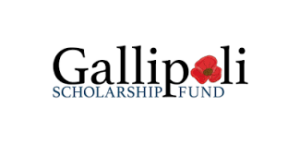 Gallipoli Scholarship
Gallipoli Scholarship
Valued at $6,000, the Gallipoli Scholarship is open to the direct descendants of any service personnel who has served in the Australian or New Zealand Defence Force in a conflict or peacekeeping operation, from the First World War to the present day.
The Scholarship selection process is based 60 per cent on necessitous circumstances and 40 per cent on academic merit.
Applications open on 1 January and close on 28 February each year.
All applicants are notified of their selection, or otherwise, by the end of March each year. Applications are submitted online via the website and require a number of documents to support the application.
Find out more at Gallipoli Scholarship
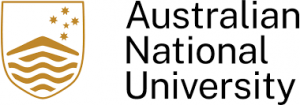
Tuckwell Scholarship
Australian National University (ANU) launched the Tuckwell Scholarship Program in 2013. The Tuckwell Scholarship Program at the ANU is the most transformational undergraduate scholarship program in Australia. A Tuckwell is not just about a student’s intellect. It is also about their desire and determination to use their natural abilities to realise their full potential so that they can make a difference in the world. All up one could say, this is no ordinary scholarship!
Scholarships are awarded based on four criteria:
- academic potential and achievements to date;
- other significant achievements to date, of any type;
- demonstration of the Attributes of a Tuckwell Scholar; and
- a desire to eventually give back to Australia.
Applications will open in March 2024. For more information browse Tuckwell Scholarship.
Occupational Therapy Degrees in Victoria in 2023

Occupational therapists assess and treat people who are limited in their ability to undertake everyday activities due to illness, injury or circumstance. They assist people to regain lost functions, develop their abilities and social skills, as well as maintain and promote independence in their everyday lives to enhance health and wellbeing – Good Universities Guide – Occupational Therapist
Occupational Therapy is offered at the following Victorian Universities:
| UNIVERSITY | VCE REQUIREMENTS | ATAR 2023 |
| ACU M – Melbourne |
Units 3 and 4: a study score of at least 30 in English (EAL) or at least 25 in English other than EAL; Units 3 and 4: a study score of at least 25 in one of Biology, Chemistry or Physics. | 83.50 (M) |
| Charles Sturt
AW – Albury-Wodonga |
No VCE prerequisites but completion of Year 12 is required and an ATAR is used in selection | 70.80 (AW) |
| Deakin
G – Geelong W’Front |
Units 3 and 4: a study score of at least 30 in English (EAL) or at least 25 in English other than EAL. | 75.45 (G) |
| Federation Uni Gi – Gippsland |
Units 3 and 4: a study score of at least 25 in any English; Units 1 and 2: satisfactory completion in two units (any study combination) of Maths: General Mathematics, Maths: Mathematical Methods or Maths: Specialist Mathematics; Units 3 and 4: satisfactory completion in one of Biology, Chemistry, Health And Human Development, Maths: Further Mathematics, Maths: Mathematical Methods, Maths: Specialist Mathematics, Physical Education or Physics. | 58.15 (Gi) |
| La Trobe B – Bendigo M – Melbourne |
Units 3 and 4: a study score of at least 30 in English (EAL) or at least 25 in English other than EAL. | 75.10 (B) 87.45 (M) |
| Monash
P – Peninsula |
Units 3 and 4: a study score of at least 27 in English (EAL) or at least 25 in English other than EAL. | 85.15 (P) |
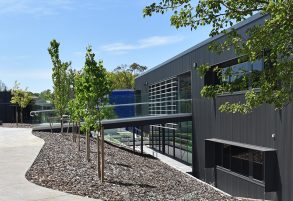
WHAT’S ON Warragul Secondary School
NOVEMBER 27 November Early Commencement Begins 28 November Studio Concert, Science Centre Lecture Theatre, 7:00 pm to 8:30 pm (select Performing Arts students) 29 November …
WHAT’S ON Warragul Secondary School
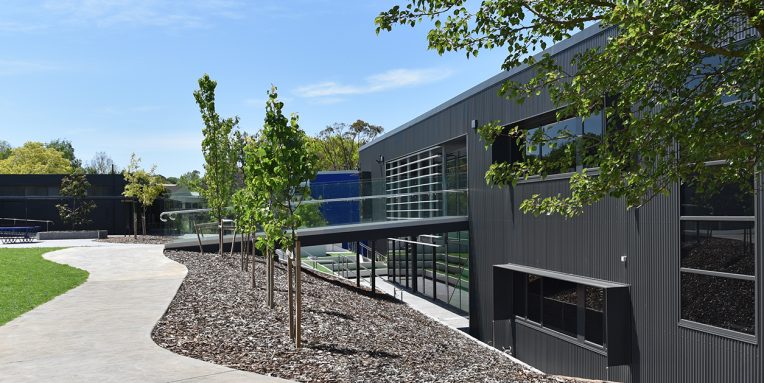
NOVEMBER
27 November Early Commencement Begins
28 November Studio Concert, Science Centre Lecture Theatre, 7:00 pm to 8:30 pm (select Performing Arts students)
29 November to 1 December Year 7 2024 Orientation
DECEMBER
5 December Student Leadership Day, 9:00 am
7 December Prideaux Gallop, Warragul Secondary School Gymnasium, 9:15 am to 10:50 am
Presentation Assembly Rehearsal, Warragul Secondary School Gymnasium, 11:15 am
8 December Presentation Assembly, Warragul Secondary School Gymnasium, 1:30 pm to 3:10 pm
End of Term 4, 3:10 pm finish
ST PAUL’S PARENT PRAYER GROUP
“Where two or three people gather in my name, I am there with them.” Matthew 18:20
The St Paul’s parent prayer group meets on the first Monday of each month during school terms. We try to keep the meeting brief (we are usually done by 9:45 am) and casual (younger children are most welcome). The group encompasses people both very comfortable with praying, as well as those newer to praying with others. Feel free to get in touch with any questions beforehand or just attend when you are able during the year.
Our next gathering is on Monday 4 December, 9:00 am in the Prideaux Centre, Warragul Junior School
Contact: Sheryn Cutler 0417 158 937 or sheryn.cutler@gmail.com
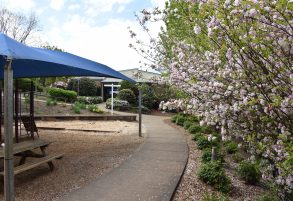
WHAT’S ON Warragul Junior School
NOVEMBER 29 November 2024 Year 7 Orientation Book Fair Closes 30 November 2024 Years 1 to 6 Transition Day 2024 Year 7 Orientation Welcome Assembly, …
WHAT’S ON Warragul Junior School
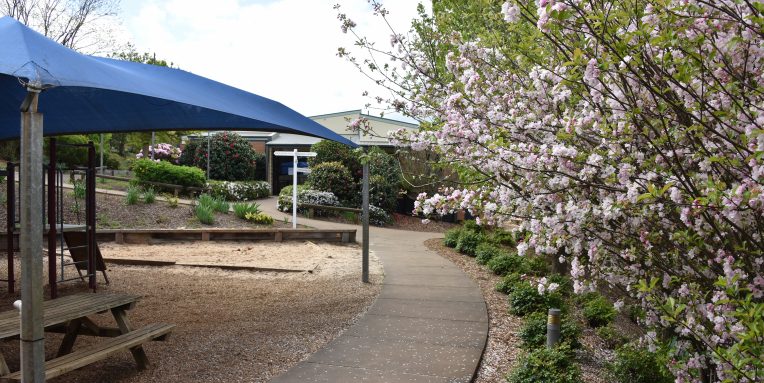
NOVEMBER
29 November 2024 Year 7 Orientation
Book Fair Closes
30 November 2024 Years 1 to 6 Transition Day
2024 Year 7 Orientation
Welcome Assembly, 2:20 pm
DECEMBER
1 December 2024 Year 7 Orientation
4 December Free Dress Day
Christmas Service Assembly, 2:20 pm
6 December Year 6 Dinner
7 December Year 6 Activity Morning
8 December Presentation Assembly
End of Term 4, 3:20 pm finish
ST PAUL’S PARENT PRAYER GROUP
“Where two or three people gather in my name, I am there with them.” Matthew 18:20
The St Paul’s parent prayer group meets on the first Monday of each month during school terms. We try to keep the meeting brief (we are usually done by 9:45 am) and casual (younger children are most welcome). The group encompasses people both very comfortable with praying, as well as those newer to praying with others. Feel free to get in touch with any questions beforehand or just attend when you are able during the year.
Our next gathering is on Monday 4 December, 9:00 am in the Prideaux Centre, Warragul Junior School
Contact: Sheryn Cutler 0417 158 937 or sheryn.cutler@gmail.com
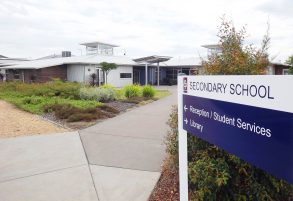
WHAT’S ON Traralgon Secondary School
NOVEMBER 24 November Year 10 Celebration Gathering 27 November Early Commencement Begins 27 November to 1 December Year 9 Edutest 29 November to 1 December …
WHAT’S ON Traralgon Secondary School
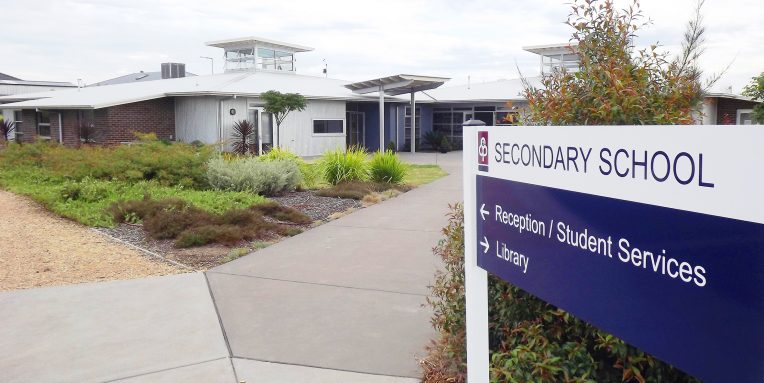
NOVEMBER
24 November Year 10 Celebration Gathering
27 November Early Commencement Begins
27 November to 1 December Year 9 Edutest
29 November to 1 December Year 7 2024 Orientation Days
DECEMBER
5 December Christmas Service Assembly
7 December Run for East Timor
Presentation Assembly Rehearsal
Theatre Sports
8 December Presentation Assembly
End of Term 4, 2:10 pm Finish
TRARALGON PARENT PRAYER MEETING
It has been wonderful having parents pray for our school community this year. Our last Prayer Meeting for the year will be held on Monday 27 November. Anyone is welcome to come along and join us. We will meet in the Junior School Office from 9:00 am to 9:30 am. If you have any questions, then speak to our Chaplain, Glen Treble.
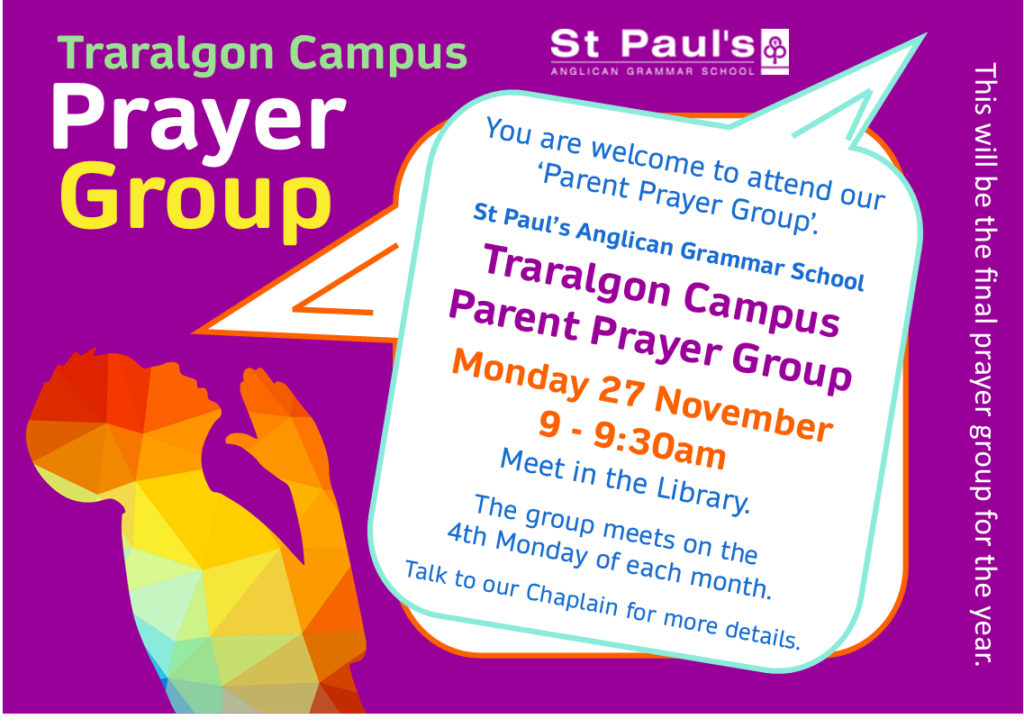
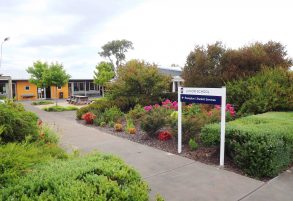
WHAT’S ON Traralgon Junior School
NOVEMBER 28 November Year 5 Market Day 29 November Orientation Day – Step Up 1 30 November Orientation Day – Step Up 2 DECEMBER …
WHAT’S ON Traralgon Junior School
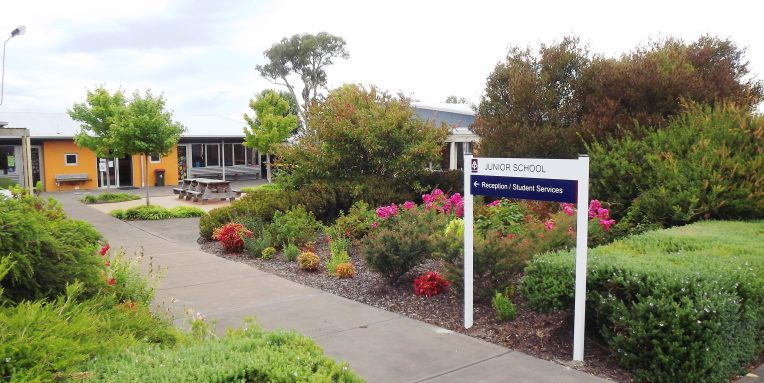
NOVEMBER
28 November Year 5 Market Day
29 November Orientation Day – Step Up 1
30 November Orientation Day – Step Up 2
DECEMBER
1 December Orientation Day – Step Up 3
State Cricket
Christmas Celebration Evening, 6:00 pm to 7:30 pm
4 December Year 6 Excursion
5 December Christmas Service
Year 6 Graduation Dinner
6 December Swim Carnival
7 December Christmas Activity Day
8 December Presentation Assembly, 12:30 pm
End of Term 4, 3:20 pm finish
TRARALGON PARENT PRAYER MEETING
It has been wonderful having parents pray for our school community this year. Our last Prayer Meeting for the year will be held on Monday 27 November. Anyone is welcome to come along and join us. We will meet in the Junior School Office from 9:00 am to 9:30 am. If you have any questions, then speak to our Chaplain, Glen Treble.




